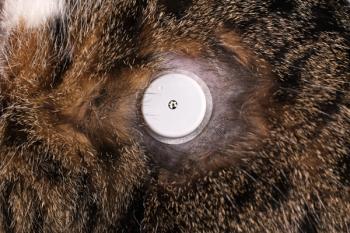
- dvm360 November 2021
- Volume 52
National Pet Diabetes Month: Raising awareness and making strides
A general overview of canine and feline diabetes, plus the efforts the Diabetes PetCare Alliance is making to diagnose affected pets and provide clients with the proper resources.
November marks National Pet Diabetes Month. Consequently, awareness is being raised about this lifelong condition affecting approximately 1 in 300 adult dogs and 1 in 230 cats in the United States1,2 to ensure veterinarians provide companion animals with proper diagnosis and treatment options so they can live fulfilling lives.
Diabetes keeps pets from producing or utilizing insulin appropriately, which prevents the conversion of food to energy; as a result, extra sugar remains in the blood resulting in lethargy and other health-related complications.3 Though this disease has no cure, it can be managed with treatment and monitoring so pets can continue to thrive.
Risk factors for diabetes
Although canines and felines can acquire diabetes at any age, diabetic dogs are usually between 4 and 14 years and receive diagnosis from 7 to 10 years, whereas cats with diabetes are typically older than 6 years old.4 In dogs, diabetes occurs in females twice more than males.4 Additionally, a study from the Journal of the American Veterinary Association5 revealed that certain canine breeds were at higher risk for developing diabetes including Samoyeds, miniature schnauzers, miniature poodles, and pugs.
Another risk factor is obesity, and aging dogs and cats may develop other diseases (eg, canine hyperadrenocorticism, feline hyperthyroidism, pancreatitis, heart disease, kidney disease; and urinary tract and skin infections) that may lead to diabetes, or that can greatly affect their response to treatment.4 Additionally, long-term use of medications including corticosteroids is a diabetes risk factor.4
Signs of diabetes
Early diagnosis is critical to helping pets live longer, healthier lives. According to the American Veterinary Medical Association,4 hallmark signs of pet diabetes include the following:
- Excessive thirst and increased urination
- Weight loss (though appetite may increase)
- Decreased appetite
- Cloudy eyes (particularly in dogs)
- Chronic or recurring infections (eg, skin and urinary tract infections)
Diabetes diagnosis and treatment
The treatment for diabetes is typically straightforward— through a general health examination, a urine test for glucose or ketones, or a blood test that detects glucose levels.3 However, additional blood tests can rule out other medical conditions, and urine cultures can eliminate the possibility of a urinary tract infection.4
Advise pet owners to manage their pets’ lifelong diabetes with daily doses of insulin, glucose monitoring, attention to diet and exercise, and regular veterinary checkups. The main goal of monitoring diabetes involves keeping a pet’s blood sugar near normal levels and avoiding life-threatening levels that are too high or too low. Each patient is unique, so they will require an individualized treatment plan consisting of a new diet and medications.4
Diabetes PetCare Alliance
The Diabetes PetCare Alliance is a partnership between Merck Animal Health, Zoetis, Purina Pro Plan Veterinary Diets, and veterinary professionals nationwide. It has been working since 2014 to inform clients about diabetes and facilitate the screenings for thousands of pets.6
Veterinary practices that joined the alliance gained access to downloadable resources for educating clients and raising awareness of the condition, thus increasing the number of pets screened for the disease during National Pet Diabetes Month and beyond. Clients whose pets receive diabetes diagnoses will get a free diabetes management kit which includes6:
- One AlphaTRAK 2 Blood Glucose Monitoring System from Zoetis
- One 6-pound bag of Purina Pro Plan Veterinary Diets DM Dietetic Management, Feline Formula for cats, or Purina Pro Plan Veterinary Diets EN Gastroenteric Fiber Balance Dry Formula for dogs
- One 10 mL vial of Vetsulin (porcine insulin zinc suspension) from Merck Animal Health
Although clinic enrollment occurred from September 1, 2021 to October 31, 2021, clients with companion animals receiving diabetes diagnoses are eligible to receive the kits from November 1, 2021, to December 31, 2021.
Takeaways
Diabetes is a lifelong condition, however early detection and proper treatment can allow pets to continue to lead happy lives. The Diabetes PetCare Alliance is helping pet parents across the nation identify diabetes in their beloved companion animals, so they can jumpstart treatment and keep pets healthy.
References
- McCann TM, Simpson KE, Shaw DJ, Butt JA, Gunn-Moore DA. Feline diabetes mellitus in the UK: the prevalence within an insured cat popula- tion and a questionnaire-based putative risk factor analysis. J Feline Med Surg 9:289-299, 2007. doi:10.1016/j.jfms.2007.02.001
- Catchpole B, Ristic JM, Fleeman LM, Davison LJ. Canine diabetes mellitus; can old dogs teach us new tricks? Diabetologia. 2005;48(10):1948-1956, 2005. doi:10.1007/s00125-005-1921-1
- Pets with diabetes can live happy, healthy lives. Pet Diabetes Month. Accessed October 5, 2021. https://usa.petdiabetesmonth.com/
- Diabetes in pets. American Veterinary Medical Association. Accessed October 5, 2021. www.avma.org/resources/pet-owners/petcare/ diabetes-pets
- Hess RS, Kass PH, Ward CR. Breed distribu- tion of dogs with diabetes mellitus admitted to a tertiary care facility. J Am Vet Med Assoc. 2000 May 1;216(9):1414-1417. doi:10.2460/ javma.2000.216.1414. PMID: 10800511.
- Enrollment opens next month for the 2021 Diabetes PetCare Alliance Program. dvm360®. August 5, 2021. Accessed October 5, 2021. www. dvm360.com/view/enrollment-opens-next-month- for-the-2021-diabetes-petcare-alliance-program
Articles in this issue
about 4 years ago
A breakthrough joint supplement for dogs and catsabout 4 years ago
Dental Pain and Inflammation—Acute and Chronicabout 4 years ago
Veterinary technicians embrace their rolesabout 4 years ago
Understanding and diagnosing canine hypothyroidismabout 4 years ago
Embark Veterinary releases first-ever purebred dog DNA kitabout 4 years ago
Zoetis adds digital cytology testing to Vetscan Imagystabout 4 years ago
dvm360® welcomes 11 new SAP partners globallyNewsletter
From exam room tips to practice management insights, get trusted veterinary news delivered straight to your inbox—subscribe to dvm360.




